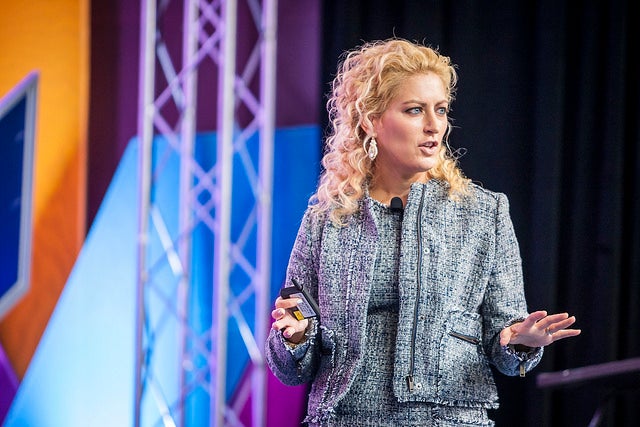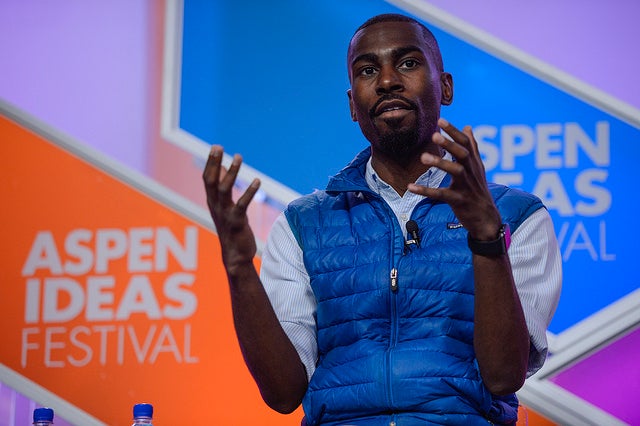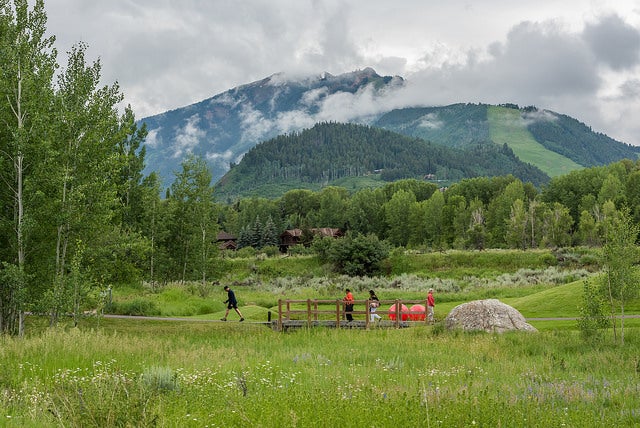At the 12th annual Aspen Ideas Festival, hundreds of the world’s most exciting medical experts, politicians, business leaders, journalists, academics, and artists flooded the Institute’s Aspen campus to discuss the ideas that are changing the planet. Read below for highlights.
Vice President Joe Biden and the Cancer Moonshot
“Imagine, given our ability to sequence the cancer genome, we’re able to aggregate all the biopsies that have been done on cancer all in one place. Imagine we can aggregate treatment processes—with supercomputers to find patterns, look at everything from lifestyle to what other drugs you’re taking, and find answers to why so many people suffer from cancer. Imagine if we were willing to share this data. Imagine what we could do. Breakthroughs are possible, but we have to change the culture, and the culture of medical research does not rest on sharing data and information. We’re not sharing data enough. If we did, we could exponentially increase the potential to answer a whole range of questions relating to cancer therapies. Hell, Uber can tell you exactly where everybody is, but there’s no place to find every cancer trial. So there’s going to be a new website that aggregates every single, solitary cancer trial in the United States.” – Vice President Joe Biden
Changing the State of the Game

“As a game designer and as a futurist I see it as my job to transport people to worlds that don’t exist, to imaginary places. Whether they are a virtual world or whether they are a world we might live in someday, a world that might come to pass or might not come to pass. And my goal as a game designer is to make sure that when people leave these imagined worlds, they feel more creative, more optimistic, and most important – more confident and certain of their own capability to transform those worlds.
When we play games, we’re constantly experiencing this sense of agency. Every turn we take, every move we make changes the state of the game, and this is why playing games can be such an empowering experience. We’re constantly aware of our power to change the scene of that world.” – Jane McGonigal, director of game research and development at Institute for the Future
What Are Reparations?

“Acknowledge the trauma and repair—that is what reparations is. Reparations might be a seeming overinvestment, but it’s for areas that have been historically and intentionally underinvested in. So in a city like Baltimore, that would mean every child getting a library at birth. That’s reparations.” – DeRay Mckesson, civil rights activist
Secretary of State John Kerry on How to Defeat Daesh
“The United States of America is more engaged in more places with more impact today than at any time in history. With violent extremism and the emergence of radical nonstate actors, everybody knows the threat: vicious attacks from Orlando to San Bernardino to the Philippines and Bali. We’ve seen shocking crimes committed against innocent civilians. We are more effectively hammering at their heavy weapons, training camps, supply routes, infrastructure. We have cut their revenue at least in half. We’re working to destroy the Daesh narrative—that they are the caliphate of the future. Daesh knows that we have to get it right 24/7, 365 days a year. They have to get it right for ten minutes.
So at this festival of ideas my idea is straightforward: We have to defeat Daesh, its affiliates, and its imitators wherever they raise their ugly heads. This is not a clash of civilizations. This is a clash of civilization against barbarism.” – Secretary of State John Kerry
Rebuilding the Law Enforcement Relationship
“As I’ve traveled the country, one of the underlying concerns I’ve heard residents say is: ‘We don’t have a connection to our local police force.’ Several years past, a huge influx of narcotics came into our communities. That certainly led to consequences that we are trying now to alleviate with criminal-justice reform. But it also led to a view that aggressive policing was necessary in order to deal with narcotics and the violent crime that comes along with them. There are those who said the pendulum swung too far in that direction.
Now, to say there is a frayed relationship between law enforcement and minority communities is the understatement of this generation. I’ve been working on finding places where communities and law enforcement are working together, making positive change, and where the police are the guardians of the community.” – Loretta Lynch, US attorney general
Register for the 2017 Aspen Ideas Festival here.

